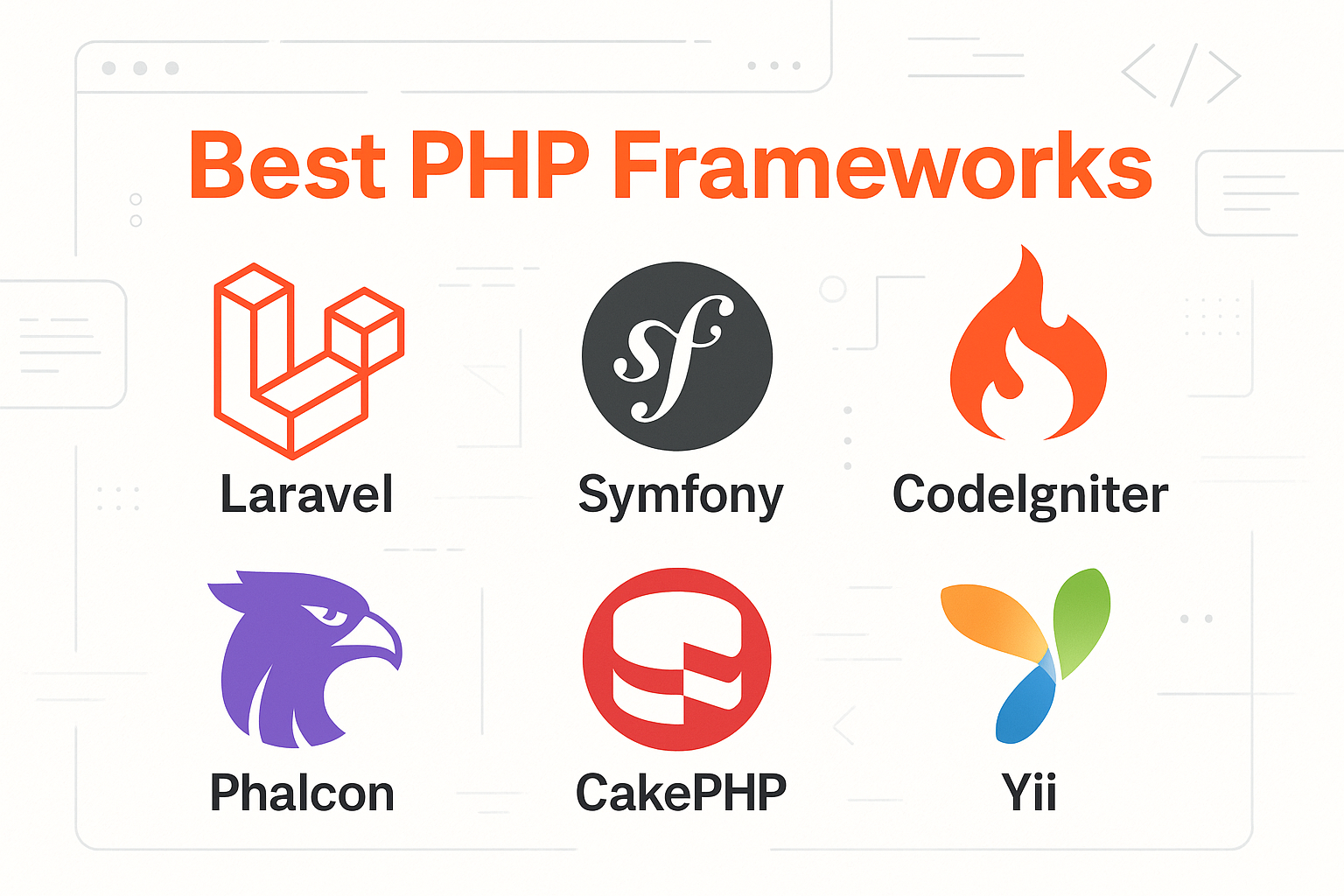Choosing among the best PHP frameworks can make or break your start-up’s web development project. With dozens of options available, from Laravel’s elegant syntax to Symfony’s enterprise-grade architecture, the decision often overwhelms even experienced development teams. The wrong choice can lead to delayed launches, budget overruns, and technical debt that haunts your project for years.
This comprehensive guide cuts through the confusion by examining the best PHP frameworks dominating 2025’s development landscape. Whether you’re a startup founder evaluating technology stacks or a developer seeking the most suitable good PHP framework for your next project, you’ll discover practical insights to make an informed decision that aligns with your specific needs, timeline, and budget constraints. We’ll explore six leading PHP frameworks, analyse their strengths and weaknesses, and provide a clear decision-making framework that considers real-world factors like team expertise, project complexity, and long-term maintenance requirements.

Why Best PHP Frameworks Still Matter in 2025
Despite the rise of JavaScript frameworks and modern alternatives, PHP continues to power over 75% of websites worldwide, making PHP frameworks more relevant than ever. The language has evolved significantly with PHP 8.x introducing performance improvements, strong typing, and modern syntax that rivals contemporary programming languages.
PHP frameworks solve critical challenges that vanilla PHP cannot address efficiently. They provide structured architectures, built-in security features, database abstraction layers, and extensive libraries that accelerate development cycles. For startups operating under tight deadlines and limited budgets, frameworks eliminate the need to build common functionality from scratch, reducing development time by 40-60%. Modern PHP frameworks also address scalability concerns that plagued earlier versions. They incorporate caching mechanisms, database optimization tools, and cloud-native features that support applications serving millions of users. Companies like Facebook, Wikipedia, and Slack continue leveraging PHP-based solutions, proving the language’s enterprise viability.
The framework ecosystem has matured substantially, offering specialized solutions for different use cases. While some of the best PHP frameworks excel in rapid prototyping, others prioritize performance or security. This diversity allows development teams to select tools that match their specific requirements rather than adopting one-size-fits-all solutions. Furthermore, the PHP community’s commitment to backward compatibility ensures long-term project stability, while regular updates introduce modern development practices without breaking existing codebases.
Top 6 Best PHP Frameworks for 2025
Laravel – The Developer’s Favorite
Laravel maintains its position as the most popular PHP web development framework, powering over 1.2 million websites globally. Its elegant syntax and comprehensive feature set make it the go-to choice for startups seeking rapid development without sacrificing code quality. The framework’s standout features include Eloquent ORM for intuitive database interactions, Blade templating engine for clean view logic, and Artisan CLI for automated tasks. Laravel’s ecosystem extends beyond the core framework, offering tools like Laravel Forge for server management, Laravel Nova for admin panels, and Laravel Horizon for queue monitoring.
For startups, Laravel’s extensive documentation and vibrant community provide invaluable support during development challenges. The framework’s modular architecture allows teams to integrate third-party packages seamlessly, while built-in features like authentication, caching, and session management accelerate time-to-market. Laravel excels in projects requiring complex business logic, content management systems, and API development. However, its resource-intensive nature may not suit high-traffic applications without proper optimization and caching strategies.
Symfony – Enterprise-Grade Reliability
Symfony represents the enterprise standard for the best PHP framework solutions, emphasizing stability, modularity, and long-term support. Many popular frameworks, including Laravel, build upon Symfony components, testament to its architectural excellence. The framework’s component-based structure allows developers to use specific parts without adopting the entire framework, providing flexibility for custom solutions. Symfony’s adherence to PHP-FIG standards ensures compatibility with other PHP tools and frameworks, making it ideal for complex enterprise environments.
Symfony’s strengths include exceptional performance, comprehensive testing tools, and extensive configuration options. The framework supports multiple database systems, provides robust security features, and offers professional support through Sensio Labs. Enterprise teams appreciate Symfony’s predictable release cycles and long-term support versions, ensuring application stability over extended periods. However, the framework’s complexity requires experienced developers and longer learning curves compared to simpler alternatives.
CodeIgniter – Simplicity Meets Performance
CodeIgniter appeals to developers seeking a lightweight, straightforward solution among the best PHP frameworks without steep learning curves. Its minimal configuration requirements and intuitive structure make it perfect for small to medium-sized projects and teams transitioning from vanilla PHP. The framework’s small footprint (under 2MB) ensures fast loading times and minimal server resources. CodeIgniter’s MVC architecture provides structure without enforcing strict conventions, allowing developers flexibility in implementation approaches.
Recent updates have modernized CodeIgniter while maintaining its core simplicity philosophy. The framework now supports namespaces, improved autoloading, and enhanced security features while preserving the ease-of-use that made it popular. CodeIgniter works exceptionally well for rapid prototyping, simple web applications, and projects with limited hosting resources. However, it lacks the extensive feature sets and modern development tools found in more comprehensive frameworks.
Phalcon – High-Performance Champion
Phalcon distinguishes itself as a C-extension among the best PHP frameworks, offering exceptional performance through compiled code execution. This unique architecture delivers speeds 3-5 times faster than traditional PHP frameworks, making it ideal for high-traffic applications. The framework provides full-stack functionality, including ORM, templating, caching, and security features, while maintaining minimal memory usage. Phalcon’s performance advantages become particularly pronounced in applications handling thousands of concurrent requests.
Despite being written in C, Phalcon offers PHP-friendly syntax and comprehensive documentation. The framework supports multiple database systems, provides advanced caching mechanisms, and includes tools for building REST APIs and web services. Phalcon suits projects where performance is paramount, such as real-time applications, high-traffic websites, and resource-intensive web services. The main drawback involves installation complexity and potential hosting limitations with shared hosting providers.
CakePHP – Convention Over Configuration
CakePHP embodies the “convention over configuration” philosophy, enabling rapid development through sensible defaults and standardized approaches. This framework particularly appeals to teams seeking consistency and reduced decision fatigue during development. The framework’s scaffolding capabilities automatically generate code for basic CRUD operations, while its ORM system simplifies database interactions through intuitive Active Record patterns. CakePHP’s plugin system facilitates code reuse and modular development approaches.
Recent versions have embraced modern PHP features while maintaining backward compatibility and upgrade paths for existing applications. The framework includes built-in testing tools, security features, and internationalization support. CakePHP excels in projects requiring rapid prototyping, content management systems, and applications with standard database operations. However, its convention-heavy approach may limit flexibility for projects requiring custom architectures.
Yii – Security-First Approach
Yii prioritizes security and performance, making it an excellent choice for applications handling sensitive data or requiring robust access controls. The framework includes comprehensive security features like input validation, output filtering, and SQL injection prevention by default. The framework’s component-based architecture promotes code reusability while its caching support enhances application performance. Yii’s Gii tool generates code scaffolding, reducing development time for common tasks.
Yii supports multiple database systems, provides extensive internationalization features, and includes tools for building RESTful APIs. The framework’s error handling and logging capabilities facilitate debugging and monitoring in production environments. This framework suits enterprise applications, e-commerce platforms, and projects requiring strict security compliance. The learning curve can be steep for developers unfamiliar with component-based architectures.
How to Choose the Right PHP Framework for Your Startup
Selecting the optimal solution among best PHP frameworks requires careful evaluation of multiple factors that impact both immediate development needs and long-term project success. Start by assessing your project’s complexity and scope. Simple websites with basic functionality may benefit from lightweight frameworks like CodeIgniter, while complex applications with sophisticated business logic often require comprehensive solutions like Laravel or Symfony.
Team expertise plays a crucial role in framework selection. Evaluate your developers’ existing skills and capacity for learning new technologies. Laravel’s extensive documentation and community support make it accessible for teams with varying experience levels, while Symfony requires more advanced PHP knowledge but offers greater architectural flexibility.
Consider your performance requirements carefully. High-traffic applications benefit from Phalcon’s exceptional speed, while projects with moderate traffic can prioritize development velocity over raw performance. Remember that premature optimization often costs more than scaling solutions as your application grows. Budget constraints significantly influence framework choice. Open-source frameworks eliminate licensing costs, but consider hidden expenses like hosting requirements, developer training, and third-party service integrations. Some frameworks require more expensive hosting solutions or specialized deployment knowledge that increases operational costs.
Timeline pressures favor frameworks with rapid development capabilities and extensive pre-built components. Laravel’s ecosystem and CakePHP’s scaffolding tools accelerate initial development, while Symfony’s component reusability benefits long-term maintenance and feature additions. For startups planning to hire developers or scale their technical teams, consider the framework’s popularity and job market availability. Laravel and Symfony developers are more readily available than specialists in niche frameworks, potentially reducing recruitment challenges.
Best PHP Frameworks Comparison: Making the Final Decision
When comparing the best PHP frameworks, create a weighted scoring system based on your project’s priorities. Performance-critical applications should heavily weight speed benchmarks, while rapid development projects prioritize ease of use and documentation quality. Security-sensitive projects require frameworks with proven track records and active security maintenance. Laravel and Symfony receive regular security updates and have dedicated security teams, while smaller frameworks may rely on community contributions for vulnerability patches.
Community size and ecosystem maturity directly impact long-term project viability. Larger communities provide more tutorials, packages, and solutions to common problems. They also ensure framework longevity and continued development support. Consider the total cost of ownership beyond initial development. Some frameworks require specialized hosting, additional tools, or extensive customization that increases ongoing expenses. Factor in maintenance costs, upgrade complexity, and potential technical debt when making your decision.
Avoid common mistakes like choosing among the best PHP frameworks based solely on popularity or personal preferences. Instead, align your choice with specific project requirements, team capabilities, and business objectives. The “best” framework is the one that enables your team to deliver quality solutions within budget and timeline constraints. For comprehensive web development services that help you implement the right PHP framework for your project, consider partnering with experienced development teams who understand the nuances of framework selection and implementation.
Conclusion
The best PHP frameworks in 2025 offer diverse solutions for different project requirements and team capabilities. Laravel continues dominating with its developer-friendly approach and comprehensive ecosystem, while Symfony provides enterprise-grade reliability for complex applications. CodeIgniter serves teams seeking simplicity, Phalcon delivers unmatched performance, CakePHP offers rapid development through conventions, and Yii prioritizes security.
Your framework choice should align with project complexity, team expertise, performance requirements, and long-term maintenance goals. Remember that the “perfect” framework doesn’t exist, but the right framework for your specific situation does. Ready to implement the ideal PHP framework for your project? Contact us to discuss your requirements and discover how our experienced development team can help you build scalable, maintainable web applications that drive business success.



